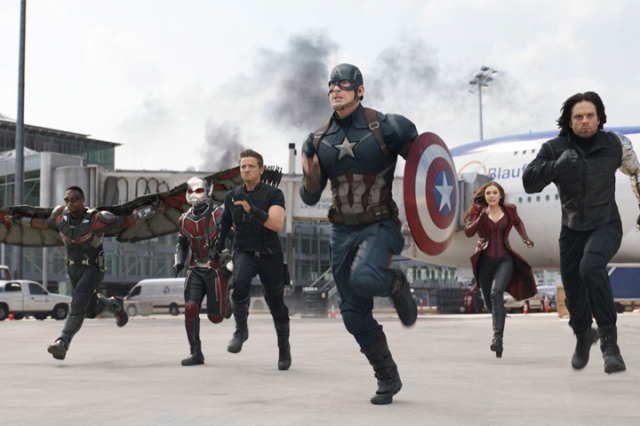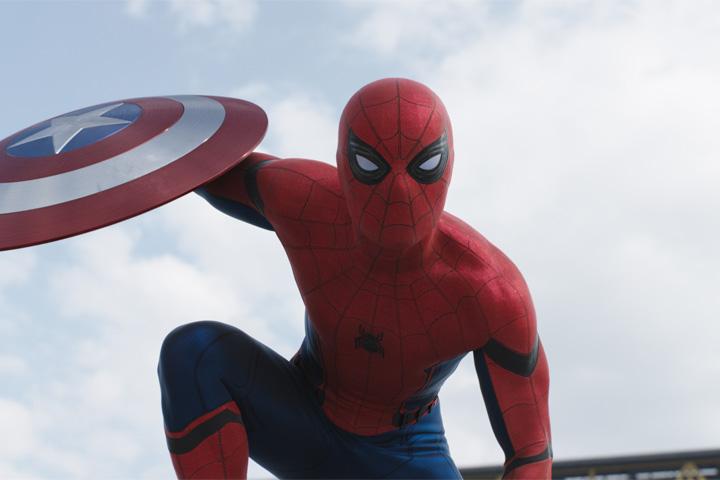Eight years after “Iron Man” kicked off the Marvel Cinematic Universe (MCU) and four years after the first “Avengers” movie succeeded in combining multiple superheroes into a single narrative, “Captain America: Civil War” is hitting cinemas.
Despite this officially being the third of Cap’s solo outings (following “The First Avenger” and “The Winter Soldier”), the story of super powered accountability makes it a direct sequel to the events of “Avengers: Age of Ultron” as well.
The film begins with the Avengers on the trail of Crossbones (“The Winter Soldier’s” Frank Grillo) in Lagos, where their pursuit results in multiple civilian casualties. Coming off the heels of similarly catastrophic events in previous MCU films, the incident provokes an international outcry for the Avengers to answer for their actions. The solution hefted on them by US General-turned-Secretary of State Thaddeus ‘Thunderbolt’ Ross (William Hurt, last seen in 2008’s “The Incredible Hulk”) is a series of accords placing the team under the direct supervision of the United Nations.
Wracked with guilt, Iron Man / Tony Stark (Robert Downey, Jr.) agrees to the proposal, causing a rift between him and Captain America / Steve Rogers (Chris Evans), who believes that putting the Avengers on a leash would negate not only their effectivity, but a betrayal of everything they stand for. Tensions reach a breaking point when the United Nations meeting meant to address the issue is attacked, with all signs pointing to Cap’s best friend, Bucky / the Winter Soldier (Sebastian Stan), as the culprit. Desperate to prove Bucky’s innocence, Cap goes rogue, forcing heroes both in and out of the Avengers to choose whose ideology they will stand behind.
After the critical and box office triumphs of “The Winter Soldier”, it remained to be seen whether or not directors Anthony and Joe Russo could replicate their success with “Civil War”, especially given the scale of the story they wanted to tell. With over a dozen characters fighting (literally and figuratively) for screen time, the narrative balancing act was considerable; even genre favorite Joss Whedon failed to stick the landing with “Age of Ultron” after setting the standard in “The Avengers”.

For the most part, the Russos manage the film’s multiple protagonists with aplomb, building on and leveraging everything we’ve learned about these characters over eight years and twelve films to great effect. Where they falter, however, is in their staging of the action sequences. While exciting enough in concept, the actual staging and execution of said scenes is somewhat lacking. Take, for instance the Lagos pursuit or the Berlin-based chase and fight sequences, which eschew “Winter Soldier’s” clean compositions, geography, and editing in favor of shaky-cam close-ups, undercranking, and fast cuts to achieve a “gritty” look that doesn’t quite work.
Faring infinitely better is “Civil War’s” main set piece, a super-powered brawl for all featuring hero versus hero at a German airport that comes across like the blockbuster version of something a kid playing with his favorite action figures might have come up with. Though the sequence never entirely bests the inter-combatant interactions or sense of awe that Whedon’s “Avengers” films excelled at, the sheer amount of invention and wit on display make for a memorable bit of spectacle to the point that we can forgive some instances of shoddy CGI.
Sadly, much like last month’s "Batman V Superman", the main villain’s (Daniel Brühl) scheme is an overly-convoluted letdown, relying far too much on coincidence, prescience, and excellent Hydra file keeping to be even the slightest bit credible. Fortunately, the performances of the actors playing the heroes prove up to the challenge of overcoming their milquetoast nemesis’ cinematic deficiencies.
As Marvel’s embodiment of the superhero ideal, Evans continues to temper his Captain America with enough of an edge that his character’s inherent decency never feels naïve or hackneyed. While some of his emotional beats require a working knowledge of everything that’s come before, we never doubt the sincerity of his motivations. Equally brilliant here is Downey, Jr., who imbues his now-signature billionaire playboy philanthropist with a pathos that sidesteps the contrived ways in which the second and third “Iron Man” films handled his inner demons.
And what of the film’s much-touted introduction of Spider-Man into the MCU (following five films under rival Sony Pictures Studios’ banner)?

Actor Tom Holland (“In the Heart of the Sea”) enters the fray as everybody’s favorite wall-crawler, bringing a refreshing wide-eyed innocence to his portrayal of Peter Parker, presented here as a hero at the dawn of his career. Based on the crowd-pleasing reactions his appearance (and that of his curiously attractive Aunt May, played by Marisa Tomei) elicited, good things would seem to be in store for the webhead’s future big screen adventures.
When all is said and done, “Civil War” may not be as genre-shattering as the first “Avengers” film, but at the same time, it manages to avoid the mind-numbing assaults on the senses that far too many films of this type have become in recent years. Indeed, by sticking to the areas the MCU has excelled at while adding layers and plot threads to the core narrative, the filmmakers have done their part to ensure that “Civil War’s” repercussions will be felt throughout the series for many more films to come, and I, for one, can’t wait to see what they’re going to serve up next.
Make mine Marvel. — AT, GMA News




